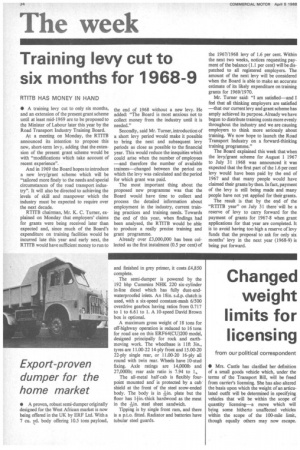Training levy cut to six months for 1968-9
Page 36

If you've noticed an error in this article please click here to report it so we can fix it.
RTITB HAS MONEY IN HAND
• A training levy cut to only six months, and an extension of the present grant scheme until at least mid-1969 are to be proposed to the Minister of Labour later this year by the Road Transport Industry Training Board.
At a meeting on Monday, the RTITB announced its intention to propose this new, short-term levy, adding that the extension of the present grant scheme would be with "modifications which take account of recent experience".
And in 1969 the Board hopes to introduce a new levy/grant scheme which will be "tailored more finely to the needs and special circumstances of the road transport industry". It will also be directed to achieving the levels of skill and manpower which the industry must be expected to require over the next decade.
RTITB chairman, Mr. K. C. Turner, explained on Monday that employers' claims for grants were being received later than expected and, since much of the Board's expenditure on training facilities would be incurred late this year and early next, the RTITB would have sufficient money to run to the end of 1968 without a new levy. He added: "The Board is most anxious not to collect money from the industry until it is needed."
Secondly, said Mr. Turner, introduction of a short levy period would make it possible to bring the next and subsequent levy periods as close as possible to the financial year. This would reduce the inequities which could arise when the number of employees —and therefore the number of available trainees—changed between the period on which the levy was calculated and the period for which grant was paid.
The most important thing about the proposed new programme was that the Board would have time to collect and process the detailed information about employment in the industry, current training practices and training needs. Towards the end of this year, when findings had been analysed, the RTITB would be able to produce a really precise training and grant programme.
Already over £.3,000,000 has been collected as the first instalment (0.5 per cent) of the 1967/1968 levy of 1.6 per cent. Within the next two weeks, notices requesting payment of the balance (1.1 per cent) will be dispatched to all registered employers. The amount of the next levy will be considered when the Board is able to make an accurate estimate of its likely expenditure on training grants for 1969/1970.
Mr. Turner said: "I am satisfied—and I feel that all thinking employers are satisfied —that our current levy and grant scheme has amply achieved its purpose. Already we have begun to distribute training costs more evenly throughout the industry and we are causing employers to think more seriously about training. We now hope to launch the Road Transport Industry on a forward-thinking training programme."
The Board explained this week that when the levy/grant scheme for August 1 1967 to July 31 1968 was announced it was expected that the first part of the 1.6 per cent levy would have been paid by the end of 1967 and that many people would have claimed their grants by then. In fact, payment of the levy is still being made and many people have not yet applied for their grants.
The result is that by the end of the "RTITB year" on July 31 there will be a reserve of levy to carry forward for the payment of grants for 1967-8 when grant applications for that year are completed. It is to avoid having too high a reserve of levy funds that the proposal to ask for only six months' levy in the next year (1968-9) is being put forward.




























































































































































